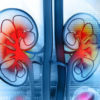Thyroid Cancer Treatment in Northern New Jersey
 Patients who have been diagnosed with thyroid cancer may not understand what the job of the thyroid is or if thyroid cancer is curable. At Bergen Medical Associates, endocrinology specialists are trained in understanding the workings of hormones and how they can affect someone’s body. With Bergen Medical Associates locations throughout northern New Jersey, patients can find quality healthcare close to home.
Patients who have been diagnosed with thyroid cancer may not understand what the job of the thyroid is or if thyroid cancer is curable. At Bergen Medical Associates, endocrinology specialists are trained in understanding the workings of hormones and how they can affect someone’s body. With Bergen Medical Associates locations throughout northern New Jersey, patients can find quality healthcare close to home.
What Is the Thyroid?
The thyroid is a butterfly-shaped gland located in the front of the neck. It is part of the endocrine system and controls many of the body’s functions by producing and releasing certain hormones. The main job of the thyroid is controlling the metabolism, which is how the body processes and transforms food into energy. The thyroid hormones also affect these bodily functions:
- Body temperature
- Breathing
- Brain development
- Digestion
- Fertility
- Heart rate
- Mental activity
- Skin and bone maintenance
What Is Thyroid Cancer?
Thyroid cancer is the growth of cancer cells that start in the thyroid. There are several types of thyroid cancer.
Differentiated Thyroid Cancers
Differentiated thyroid cancers start in the cells that produce and store thyroid hormones. Those cells are called follicular cells. Differentiated thyroid cancer cells appear like healthy cells when viewed under a microscope.
Papillary Thyroid Cancer
Papillary thyroid cancer is the most common and can happen at any age, although it mostly affects people aged 30 to 50. Most papillary thyroid cancers are small and respond well to treatment, even if the cancer cells spread to the lymph nodes in the neck. A small portion of papillary thyroid cancers are aggressive and may grow to involve structures in the neck or spread to other areas of the body.
Follicular Thyroid Cancer
This is a rare type of thyroid cancer that usually affects people older than 50. Follicular thyroid cancer cells do not usually spread to the lymph nodes in the neck, but some large and aggressive cancers may spread to other parts of the body. Follicular thyroid cancer most often advances to the lungs and bones.
Hurthle Cell Thyroid Cancer
Hurthle cell thyroid cancer is a rare type that was once considered a type of follicular thyroid cancer. It is now its own type because the cancer cells behave differently and respond to different treatments. Hurthle cell thyroid cancers are aggressive and can grow to involve structures in the neck and spread to other parts of the body.
Poorly Differentiated Thyroid Cancer
Poorly differentiated thyroid cancer is rare and is more aggressive than other differentiated thyroid cancers. It often does not respond to the usual treatments.
Anaplastic Thyroid Cancer
This rare type of thyroid cancer grows quickly and can be difficult to treat, but treatments can help slow the progression of the disease. Anaplastic thyroid cancer tends to occur in people older than 60 and can cause severe signs and symptoms, like neck swelling that worsens very quickly. It may also lead to difficulty breathing and swallowing.
Medullary Thyroid Cancer
Medullary thyroid cancer is rare and begins in thyroid cells called C cells, which produce the hormone calcitonin. Elevated levels of calcitonin in the blood can indicate medullary thyroid cancer at a very early stage. Some medullary thyroid cancers are caused by a gene called RET that is passed from parents to children.
Other Rare Types of Thyroid Cancer
Other rare types of cancer can start in the thyroid. These include thyroid lymphoma, which begins in the immune system cells of the thyroid, and thyroid sarcoma, which begins in the connective tissue cells of the thyroid.
What Causes Thyroid Cancer?
Thyroid cancer happens when the cells in the thyroid mutate, grow, and multiply rapidly, creating a mass cell tumor. A tumor can grow to invade nearby tissues and even spread to the lymph nodes. Doctors do not understand what causes the DNA changes in the cells that lead to thyroid cancer.
What Are the Symptoms of Thyroid Cancer?
For many people, the first sign of thyroid cancer is a lump or growth on the neck. Other symptoms can include:
- Difficulty breathing or swallowing
- Loss of appetite
- Loss of voice
- Nausea
- Swollen lymph nodes
- Tiredness
- Unexpected weight loss
How Is Thyroid Cancer Diagnosed?
If a healthcare provider finds a lump on someone’s neck, they may order more tests to confirm the diagnosis. Some of those diagnostic tests include:
- Blood test: This is used to check levels of certain hormones and gauge whether a thyroid is functioning properly.
- Biopsy: Using a fine needle aspiration, a doctor can remove cells from the thyroid to test for cancer.
- Radioiodine scan: This test, also called thyroid uptake, can detect whether thyroid cancer has spread. It involves taking radioactive iodine pills. The thyroid absorbs the iodine, then the healthcare provider uses a special device to measure the amount of radiation in the gland.
- Imaging scans: Computed tomography (CT) scans can detect thyroid cancer and see if it has spread throughout the body.
What Are the Treatment Options for Thyroid Cancer?
Once a thyroid cancer diagnosis has been confirmed, the next step is determining what type of treatment to start. The type of treatment a doctor chooses depends on the size of the tumor and whether the cancer has spread. Treatments for thyroid cancer include:
- Surgery: This is the most common treatment for thyroid cancer and involves removing part or all of the thyroid. Often, the lymph nodes will also be removed.
- Radiation therapy: Radiation can kill cancer and stop cancer growth. An external radiation machine delivers strong beams of energy to the tumor site to kill the cells.
- Chemotherapy: Using chemotherapy drugs kills cancer cells and stops cancer growth. Very few people diagnosed with thyroid cancer will need chemotherapy.
- Hormone therapy: This treatment blocks the release of hormones that can cause cancer to spread.
Find Thyroid Cancer Treatment Options
Patients seeking treatment for thyroid cancer can see the team of endocrinology and metabolism specialists at Bergen Medical Associates. The medical team works collaboratively with all the doctors involved in the patient’s care. All health records are electronic, making communication with other physicians easier. Our providers construct treatment plans based on complete information about the patient.
With office locations throughout northern New Jersey, Bergen Medical Associates provides patients with multiple medical specialties, including endocrinology. We have on-site comprehensive care, including diagnostic testing and ambulatory surgical centers when needed. Contact Bergen Medical Associates today to schedule an appointment.










